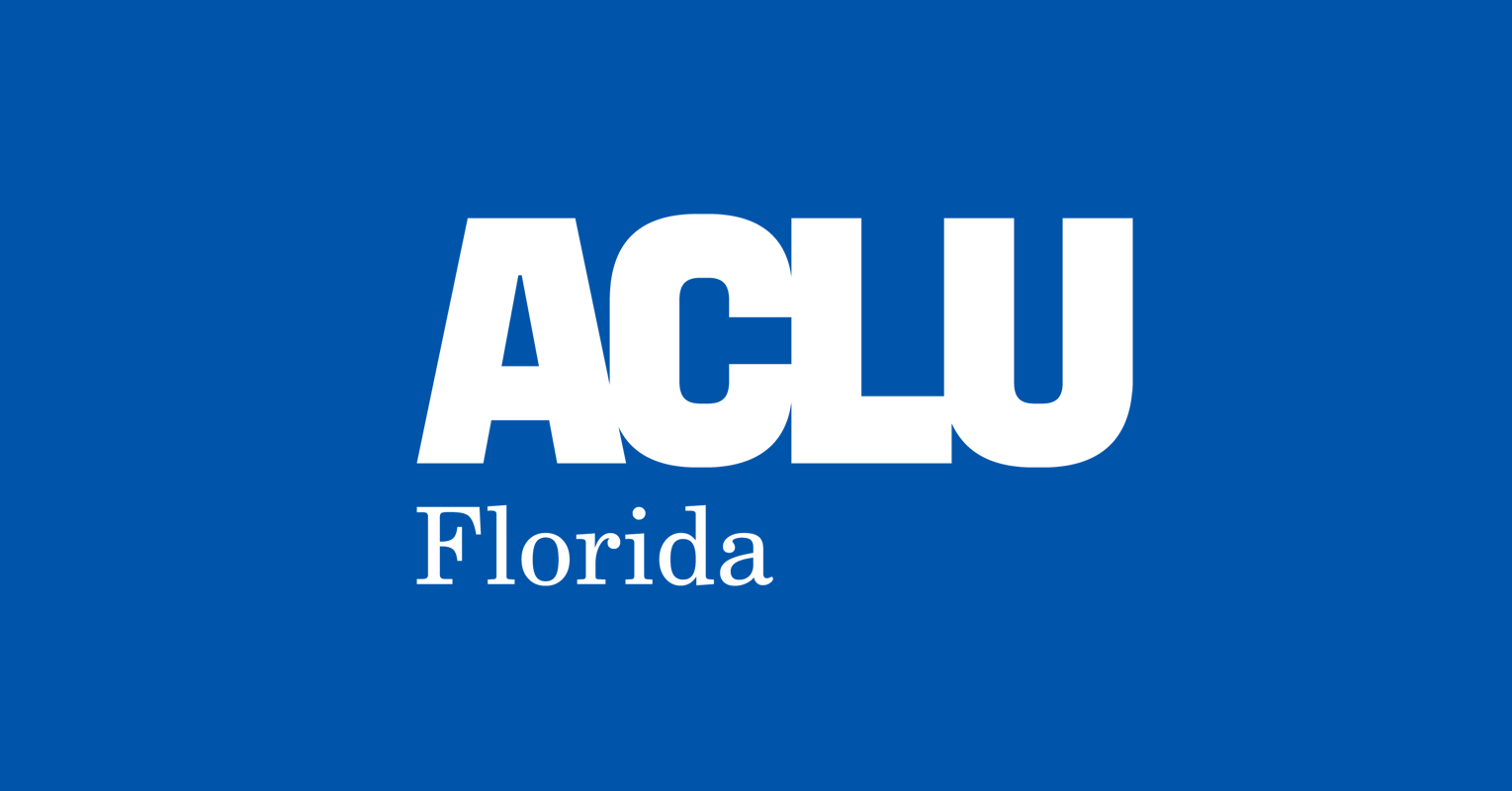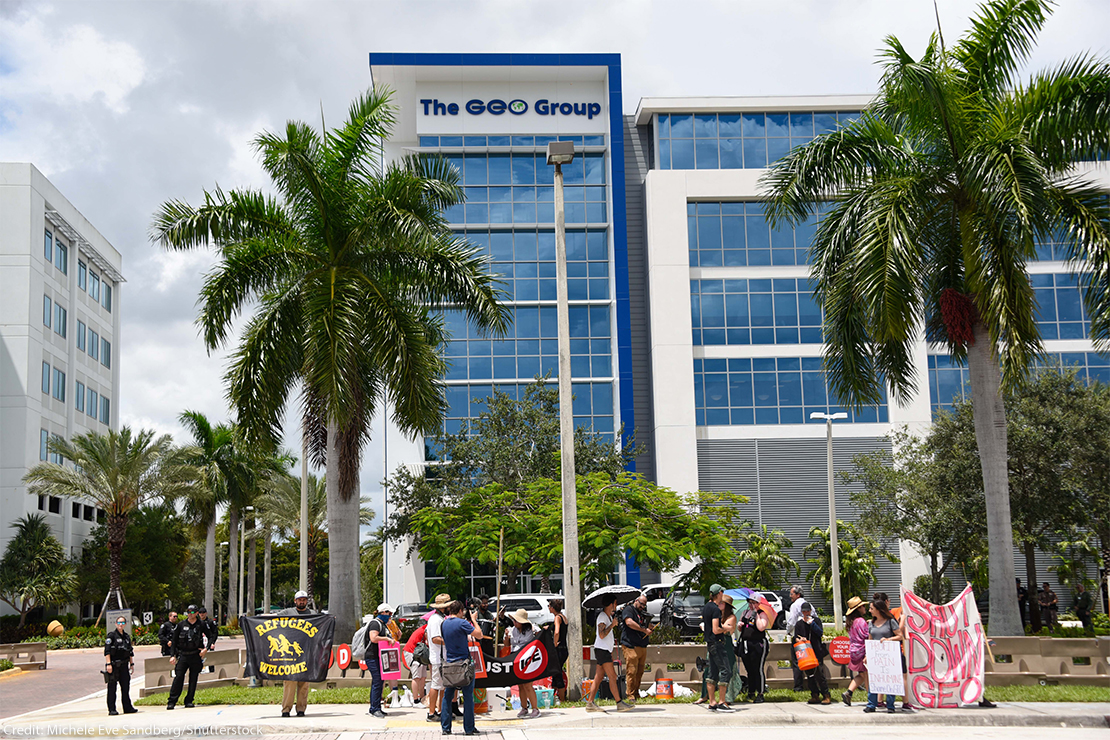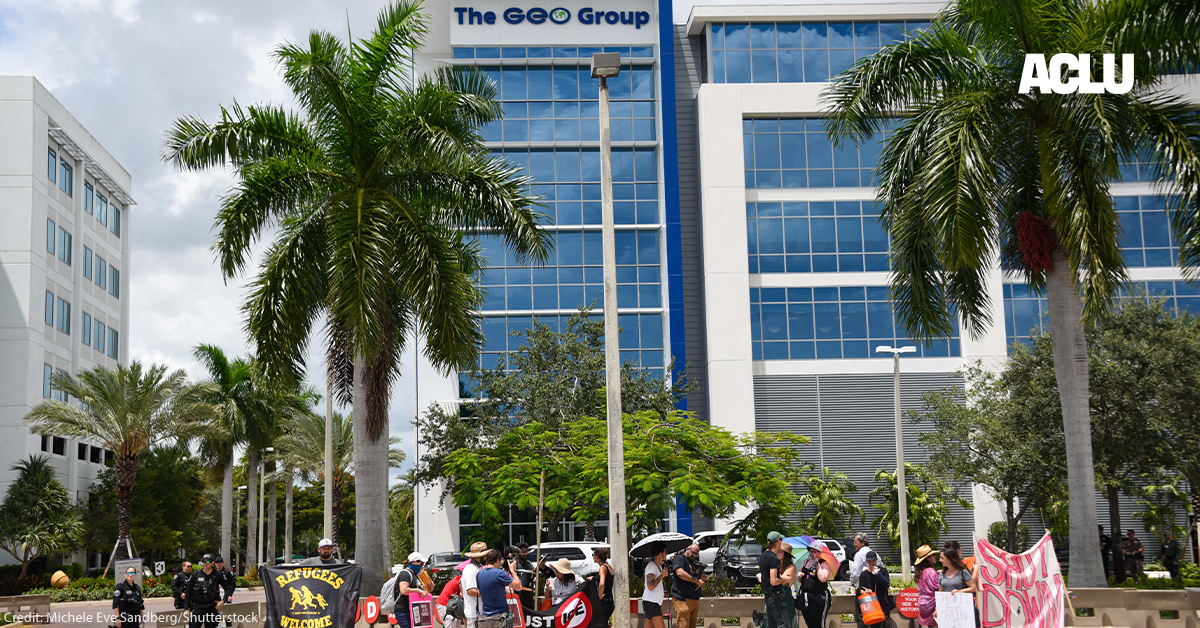Three years into the Biden administration, the number of people held in ICE detention continues to grow, and private prison companies hold an increasingly tight grip on the mass immigration detention system.
As the ACLU has documented before, the federal government’s immigration detention system overwhelmingly relies on private prison corporations. Private prison corporations, like the GEO Group, CoreCivic, LaSalle Corrections, and the Management Training Corporation have pocketed billions from ICE detention contracts in the past two decades.
As a candidate, President Biden promised to stop the use of private prison companies for immigration detention. In 2021, he announced that there should be “no private prisons, period,” when addressing protesters demanding the end to immigration detention.
Although the Biden administration issued an executive order in January 2021 directing the Department of Justice to phase out its contracts with private prison companies, it notably excluded ICE detention from the order. Since then, the number of immigrants detained by ICE — and revenues for private prison companies — have only increased.
The Number of Immigrants Detained Under the Biden Administration Continues to Grow
As of July 2023, ICE detains on average 30,003 people each day. This is a significant increase from the start of the Biden administration in January 2021, when ICE held an average of 15,444 people in detention each day.
The Biden Administration Increasingly Relies on Private Prison Corporations to Detain Immigrants: Nine Out of Ten People in ICE Detention Are Now Held in Private Prison Facilities
Under the Trump administration, 81 percent of people detained each day in January 2020 were held in facilities owned or operated by private prison corporations.
In the first two years of the Biden administration, this number remained relatively unchanged. In September 2021, 79 percent of people detained each day in ICE custody were held in private detention facilities.
In the last two years, however, this number has markedly increased: as of July 2023, 90.8 percent of people detained in ICE custody each day are held in detention facilities owned or operated by private prison corporations.
Private Prison Corporation Revenues from ICE Detention Have Skyrocketed
Contracts for ICE detention continue to make up a significant amount of revenue for private prison corporations like the GEO Group and CoreCivic. In 2022, the GEO Group made $1.05 billion in revenue from ICE detention contracts alone, or 43.9 percent of its total revenue ($2.4 billion).
CoreCivic similarly made $552.2 million in revenue from ICE detention contracts in 2022, representing 30 percent of its total revenue.
Despite calls from advocates to decrease funding for ICE detention, Congress appropriated $2.9 billion dollars to hold 34,000 people in ICE detention each day for FY 2023.
The Biden Administration Has Failed to Reverse the Trump Administration’s Expansion of Immigration Detention, As Abuses in ICE Detention Continue
During the Trump administration, ICE expanded the immigration detention system by 50 percent, signing contracts to open over 40 new detention facilities. This expansion overwhelmingly benefited private prison companies, including contracts providing “guaranteed minimums,” where detention contractors receive a set amount of funds for detention, regardless of the number of beds used. These facilities included several known for poor conditions, understaffing, and safety issues that had led the Department of Justice to cancel its prison contracts in recent years.
The Biden administration has done little to reverse these trends. The Executive Order failed to end the use of private prisons for those in federal criminal custody, as private corporations found workarounds by contracting with local governments, who then contracted with the Department of Justice to extend their contracts. After the DOJ terminated its contract with the GEO Group, Inc., for the use of the Moshannon Valley Correctional Facility in Pennsylvania, it then became a new ICE detention facility. Similarly, the GEO Group touted the recent expansion of its contract at the Desert View Annex ICE Detention facility as helping to “offset” revenue decreases due to facility closures resulting from the Executive Order in its report to the Securities Exchange Commission.
The Biden administration has also kept open detention facilities that its own oversight agencies have recommended for closure in light of abusive conditions and safety risks. For example, ICE refused to close the Torrance County Detention Facility in Estancia, New Mexico (run by CoreCivic), even after the DHS Office of Inspector General issued a management alert calling for the immediate removal of all detainees at the facility, and the death of Kelsey Vial, an immigrant from Brazil, only months later.
At the Central Louisiana ICE Processing Center in Jena, Louisiana, run by GEO, Ernesto Rocha-Cuadra, a 42-year-old immigrant, died after suffering a heart attack. He had submitted dozens of grievances alleging that he was refused medical care, denied access to his personal detention records and was subject to mistreatment and negligence by guards.
Other facilities, such as the Baker County Detention Center in Macclenny, Florida, where the ACLU of Florida has documented sexual voyeurism by facility staff, denial of sanitary napkins to women as punishment, medical neglect and beatings, remain open, despite repeated calls for closure.
The Biden administration can reverse course on immigration detention. It should dramatically reduce the number of people in ICE detention, invest in alternatives to detention, and stop allowing private prison companies from profiting by the billions of dollars each year off the suffering of immigrants in detention.


